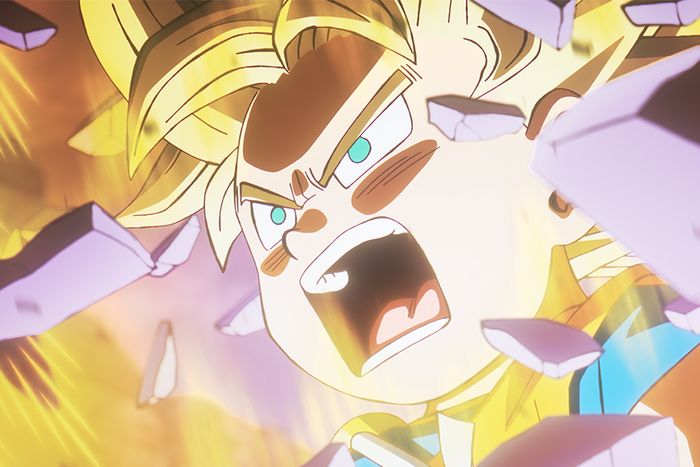
Dragon Ball seems like the kind of thing that would be easy to outgrow. To the casual observer, the late Akira ToriyamaÔÇÖs wildly influential creation largely comprises the sort of things boys think are cool: muscles, violence, and spiky hair. But spend any significant amount of time with the franchiseÔÇÖs inescapable touchstones ÔÇö and the constant memes and references theyÔÇÖve inspired for decades ÔÇö and itÔÇÖs clear thereÔÇÖs something universal there. And with this monthÔÇÖs twin launch of a new anime, Dragon Ball Daima, and the video game Dragon Ball: Sparking! ZERO, itÔÇÖs worth taking a moment to appreciate why.
As an ongoing serial narrative spanning multiple media, Dragon Ball is both comically straightforward (a story about a bunch of powerful warriors who defend the earth from various threats) and remarkably versatile. Across its 40-year history, it has been a Looney TunesÔÇôesque farce, a boyÔÇÖs adventure story, a screwball comedy, a domestic sitcom, clutch fitness inspo, a morality play, a sci-fi horror story, and a sports drama, sometimes all at once. Tying it all together is Goku, a goofy little kid from another world that stumbled his way into protecting this one.
In various series, Goku grows from boy to man to dad (and sometimes back, as this weekÔÇÖs Daima premiere kicks off with the hero now magically kid-size again), and itÔÇÖs from his perspective that the franchiseÔÇÖs ÔÇ£dudes rockÔÇØ approach to storytelling crystallizes. Dragon Ball as a franchise is so earnestly, completely, and approachably committed to its masculine worldview that it paradoxically circles back around to being universal.
Even with its at times world-shattering stakes, thereÔÇÖs a quintessential just-guys-being-dudes vibe to Dragon Ball that remains quite singular, even though itÔÇÖs inspired countless imitators. Perhaps itÔÇÖs in Dragon BallÔÇÖs ability to be as deadly serious as its muscled hypermasculine aesthetic can imply while also laughing at itself for being so dire. Dragon Ball Super, the 2015 anime that was the franchiseÔÇÖs most recent TV outing, began with the Earth threatened by a catlike god of destruction capable of destroying entire worlds with the flick of a wrist, yet it also made him an easily distracted epicurean who can be talked out of genocide by the thought of all the cuisine he would miss out on thanks to his mass murder. It has one of its resident badasses, Vegeta, easily swatted away in a brawl in favor of a game of high-stakes rock, paper, scissors with an anthropomorphic pig. It is just as likely to expend energy on its heroes begrudgingly going shopping with their wives or arguing about dishes as it is to narrate their ability to suplex a mountain. The guys of Dragon Ball are so cool, but theyÔÇÖre also ridiculous, and thatÔÇÖs why we love them.
As a story that started with its protagonist as a boy, it has also developed a boyÔÇÖs view of what masculine adulthood looks like: a single-minded approach toward self-improvement. WhatÔÇÖs beautiful about this is the way that Goku and his cohort put that philosophy into practice. In the world of Dragon Ball, itÔÇÖs hard to improve at anything if thereÔÇÖs no one to improve with, and so community forms. Sparring partners and former foes become friends, friends share the load when any one struggle becomes too much, families form in the sincere hope that the next generation is better than this one.
To be crystal clear, Dragon Ball is not ironically gendered. It is entertainment for boys; fighting is the fuel that drives all of its character growth. Women are often frightening and fickle, deeply admired by the seriesÔÇÖ male heroes, who are also a little terrified of them. (Ladies do sometimes get to kick ass, but the final fight is usually a manÔÇÖs job.) Children, hilariously, just sort of turn up, as romance is entirely elided but parentage is always clear.
These limitations oddly add to Dragon BallÔÇÖs appeal. It is never more than what it is, and yet at its best there is a bigheartedness to its characters and worldview that make it endlessly easy to accept what it is not. You donÔÇÖt have to identify as male to say ÔÇ£dudes rock,ÔÇØ nor to be a dude who rocks. And goddamn, when youÔÇÖre watching Dragon Ball? Or playing a Dragon Ball game with a friend? Dudes freaking rock.

